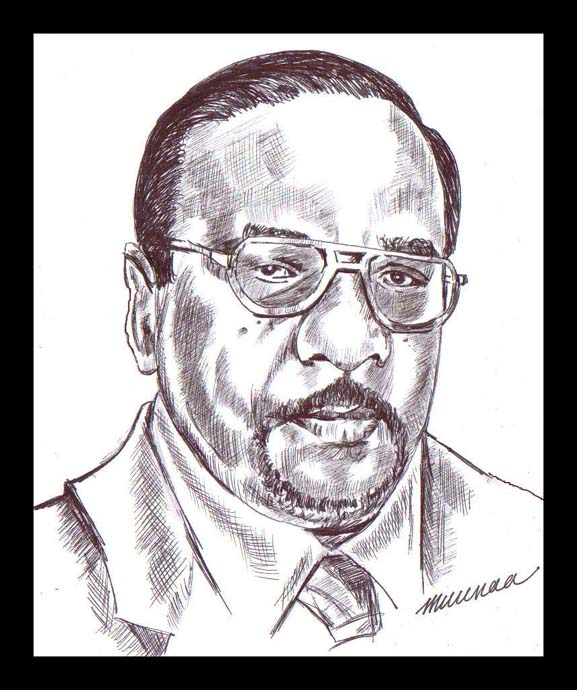 by Tamil Guardian, London, December 14, 2016
by Tamil Guardian, London, December 14, 2016
Today marks 10 years since the passing of Anton Balasingham, the chief negotiator and political strategist of the Liberation Tigers of Tamil Eelam (LTTE).
Mr Balasingham – or Bala Anna as he was fondly known – was deeply adored by the Tamil people. His charismatic addresses drew tens of thousands, as he untangled political analysis with razor sharp wit. Leading LTTE delegations through numerous negotiations, Bala Anna eloquently and forcefully articulated the rights of the nation. His intellectual prowess and political acumen earned him respect from all sides of the negotiating table.
He remains an extraordinary theoretician and a formidable figure within the Tamil struggle.
The special relationship he held with the Tamil Guardian is a bond that we remain deeply proud of today.
A nation mourns
Mr Balasingham, aged 68 years, passed away at his home in south London on 14th of December 2006. His death sparked grief across the Tamil nation, with three days of mourning declared.
An estimated 50,000 Tamils from Britain, across Europe and other diaspora centres attended h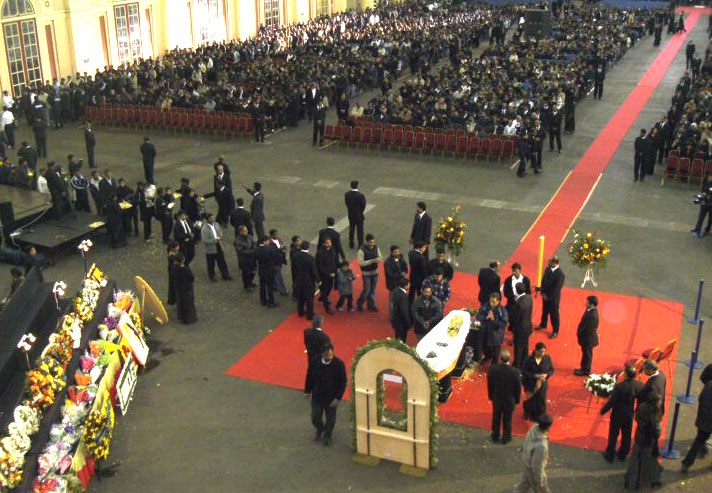 is funeral, queuing patiently for hours to place wreaths and flowers alongside Mr Balasingham’s body lying in state at Alexandra Palace.
is funeral, queuing patiently for hours to place wreaths and flowers alongside Mr Balasingham’s body lying in state at Alexandra Palace.
The ceremony was broadcast live across the world to North America, India, Australasia and Vanni, where commemorations were simultaneously taking place with tens of thousands of attendees.
In the Tamil homeland LTTE leader Velluppillai Prabhakaran led commemorations alongside other senior commanders.
“A source of unwavering strength in the political and diplomatic efforts of our freedom movement, and the light of our nation is extinguished,” he said in a condolence message. “It is an irreplaceable loss for our entire nation and for me.”
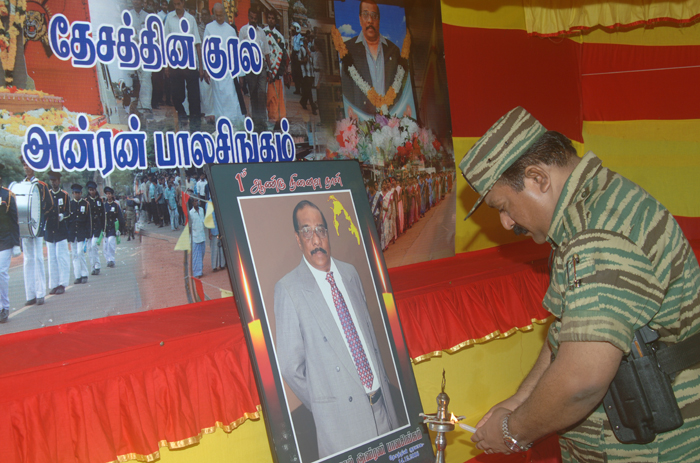 Bestowing the title “Voice of the Nation” on Mr Balasingham, the LTTE leader went on to add:
Bestowing the title “Voice of the Nation” on Mr Balasingham, the LTTE leader went on to add:
“There is a permanent place for Bala annai in the development and growth of our expanding movement. As elder statesman, as ideologue, as philosopher, above all as my intimate friend, he gave me inspiration and encouragement; gave advice and support. He shared my feelings and my burden. From the very inception of our movement he shared with me burdens of all the trials, tribulations, challenges and difficulties. He stood as the protagonist in the forefront of our political and diplomatic maneuvers.”
“Bala annai has, in truth, not departed from us. He will remain in our stream of consciousness as an enduring memory, forever.”
“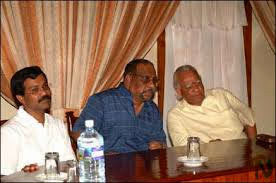 He shone bright as a gifted diplomat endowed with impressive political acumen who could direct, and express with clarity diplomatic and strategic moves of our leadership.”In a speech from the Tamil homeland that was broadcast live to London, head of Liberation Tigers Political Division S P Thamilchelvan, said Mr Balasingham,
He shone bright as a gifted diplomat endowed with impressive political acumen who could direct, and express with clarity diplomatic and strategic moves of our leadership.”In a speech from the Tamil homeland that was broadcast live to London, head of Liberation Tigers Political Division S P Thamilchelvan, said Mr Balasingham,
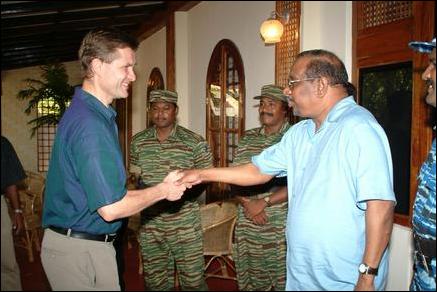 “We respected him as a guru,” said the LTTE’s military spokesman Rasaiah Illantherian. “All of us read his books. He motivated us for our struggle.”
“We respected him as a guru,” said the LTTE’s military spokesman Rasaiah Illantherian. “All of us read his books. He motivated us for our struggle.”
Senior political figures, including current Tamil National Alliance leader R Sampanthan mourned Mr Balasingham’s death, stating that it came at a “critical juncture in the political struggle of the Tamil people [and] has caused much grief”.
Mr Balasingham “had clear comprehension of the political aspirations and goals of the Tamil people,” he added. “He was able to articulate the views of the Tamil people on these questions with clarity.”
Tributes worldwide
Tributes hailing Mr Balasingham flooded in from all over the world following his passing. In Tamil Nadu, parties across the political spectrum united in their grief and sent messages of condolence across the Palk Strait.
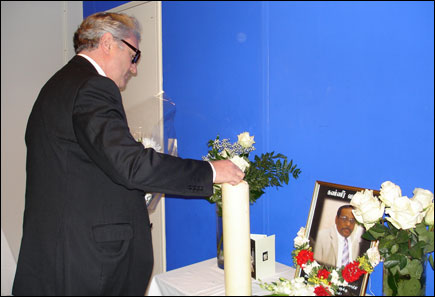 Then Chief Minister of Tamil Nadu M Karunanidhi praised Bala Anna, stating he had “kept the flame of self-respect of Tamils burning bright until his last breath”.
Then Chief Minister of Tamil Nadu M Karunanidhi praised Bala Anna, stating he had “kept the flame of self-respect of Tamils burning bright until his last breath”.
Amongst the others who sent messages of condolence were Vaiko, the General Secretary of the MDMK, Dr S Ramathas of the Pattali Makkal Katchi (PMK), Thol Thirumavalavan, the General Secretary of ‘Viduthalaich Siruththaigal’, Pala Nedumaran, the Leader of Tamil National Organization, K Vijayakanth, the Leader of Tamil National Dravidian Progressive Party and K Veeramani, the Leader of Periyar Dravidian Party.
A four-person Norwegian delegation also attended Mr Balasingham’s funeral in London. Then International Development Minister Erik Solheim, gave a short speech saying Mr Balasingham had shown his strength and dignity to the very end. “He was a sincere person. He was on the very few people [in the peace process] who never lied to me amongst many people from all communities,” continued Mr Solheim.
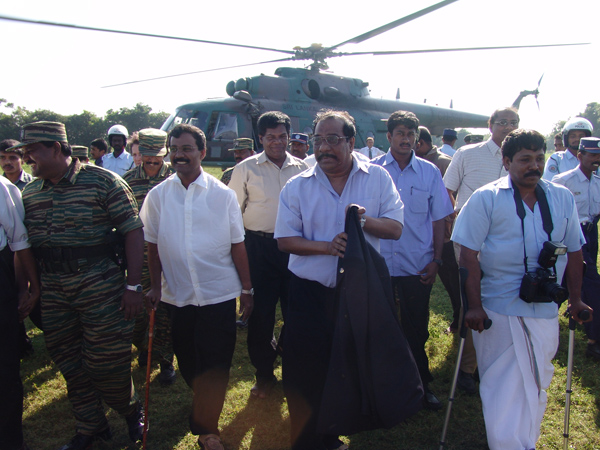 At a memorial in Oslo the Norwegian special envoy for the peace process in Sri Lanka Jon Hansen-Bauer said he had “not met a person, both among Tamils and Singhalese, who did not respect him for his steadfastness”.
At a memorial in Oslo the Norwegian special envoy for the peace process in Sri Lanka Jon Hansen-Bauer said he had “not met a person, both among Tamils and Singhalese, who did not respect him for his steadfastness”.
“Anton Balasingham was a theoretician. I had great pleasure discussing with him the key thinkers in Europe and relate their philosophy and approach to the peace process in Sri Lanka,” Mr Bauer added. “He could draw the lines back to 1970’s, 80’s and to the first talks in Thimpu, to the five rounds of talks that did not work, and tell us the focus needed in the sixth and the new rounds of talks. He was not only a experienced man; he was also a negotiation practitioner.”
“With the demise of Mr. Balasingham, the 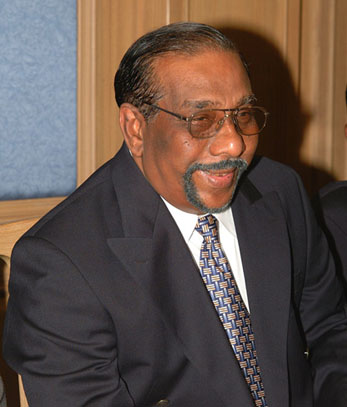 LTTE has lost its Chief negotiator; the Tamil people have lost one of their most important spokesman; an unbeatable power standing for the
LTTE has lost its Chief negotiator; the Tamil people have lost one of their most important spokesman; an unbeatable power standing for the
Tamil people, forcefully articulating their rights… And, Norway will miss a trusted friend and a central wall in the building of “Peace” constructed painstakingly block-by-block, has fallen,” he concluded.
In an obituary, The Times of London described Mr Balasingham as “the one man the Tigers could trust with their destiny in what looked like being a breakthrough in talks.”
Bala Anna’s indomitable character and commitment to reliving the suffering of his people is best illustrated in his own words. In his final words to the public, as he announced news of his illness just three weeks before he passed away, he said his aggressive cancer was “an unfortunate personal tragedy”.
“However, when compared to the vast ocean of the collective tragedy faced by my people, my illness is merely a pebble,” he continued.
“I am deeply sad that I am crippled by this illness, unable to contribute anything substantial towards the alleviation of the immense suffering and oppression of my people.”